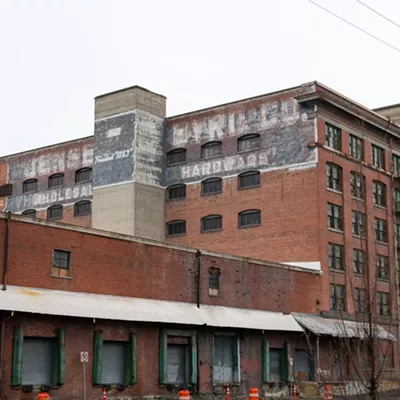
As Washington lawmakers prepare to return to the state capitol for the start of the 2025 legislative session on Jan. 13, local officials have been presenting their legislative agendas in hopes of getting financial support or state policy changes. From increased tax distributions to heightened funding for regional recreation, we've gathered some of the most pressing priorities from Spokane County and the cities of Spokane and Spokane Valley.
WASTE TO ENERGY FUNDING
Spokane's Waste to Energy Facility, which incinerates solid waste and transforms it into electrical energy, is a major player in the city's waste stream. Every day, the facility handles 800 tons of our garbage and over a year it has a generating capacity of about 22 megawatts, which is enough electricity to power about 13,000 homes.Burning waste can emit harmful greenhouse gases, which makes these types of facilities subject to the state's Climate Commitment Act, or CCA. Passed in 2021, the landmark climate law requires the state's top polluters to purchase emission allowances equal to their greenhouse gas output and to reduce emissions over time.
In its list of legislative priorities for 2025, Spokane County argues that the area's residents will pay $8 million annually due to the CCA regulations. The county is asking the Legislature to introduce an exemption into the landmark climate law that would be similar to the current exemption for landfills.
The city of Spokane, however, has asked the Legislature for help bringing the facility into compliance with the law, rather than help changing the law, says Spokane City Council member Paul Dillon.
"With the Climate Commitment Act passing, that did include the phase out of the Waste to Energy Facility because it wasn't seen as compliant with this clean energy legislation," Dillon says. "The proposal that we're working on would include funding for technology to bring it in compliance with state law."
The facility was built in 1991 as an alternative to placing landfills above the region's main water source, the Spokane Valley-Rathdrum Prairie Aquifer. Dillon says that if the facility shuts down due to costs incurred by its noncompliance with state climate law, the city's waste would instead be transported to a landfill in Adams County.
"I don't think that Spokane dumping its waste in a poor rural community is a solution that anybody should support, so we're at this inflection point," he explains. "I think the way to move forward is to invest in new technologies such as carbon sequestration."
CANNABIS TAX DISTRIBUTION
When Washingtonians voted to legalize recreational cannabis in 2012, the initiative included a hefty 37% excise tax on its retail sale.In fiscal 2024 (July 2023 through June 2024) there were more than $1.2 billion in retail cannabis sales, which brought in about $455 million in retail excise taxes, according to the state Liquor and Cannabis Board.
Currently, only 5% of that collected tax is distributed back to the cities and counties that retail stores are located in, based on population. The rest is either placed into the state's general fund or used to pay for state health care services, licensing, education and recreational cannabis research.
In 2024, Spokane County received more than $850,000 from those excise taxes.
Spokane Valley separately received $281,566 of the cannabis excise tax, but city officials think the distribution should be higher — four times higher, to be precise. The Spokane Valley City Council is advocating for the 5% distribution to be increased to 20%.
"We are seeking a formulaic change in the sense of how much money comes here," Spokane Valley City Council member Al Merkel said at a Dec. 17 meeting. "We're not looking for an increase in the taxation. I think that the 40% taxation that has already been provisioned is a sufficient amount. It's just that the amount should be distributed more equitably."
This request to the Legislature is also partially in response to the way these taxes have been distributed to other services, Spokane Valley Mayor Pam Haley says.
"When it was legalized, the tax was supposed to go to the schools. Well, now they say the schools are short on money, and the money just goes into the general fund. It doesn't go towards the schools," Haley tells the Inlander. "They were also going to send money back to the local jurisdictions to help with public safety costs. They didn't do that either. So it's a lot of promises and a lot of that not happening."
If the Legislature agrees and chooses to increase the local distribution, Haley says Spokane Valley would likely use the extra funds for public safety.
Currently, Spokane Valley only has three retail cannabis shops due to city legislation passed soon after recreational marijuana was legalized. Haley says her City Council predecessors were worried about problems surrounding potential retail cannabis shops.
Though she hasn't spoken with the rest of the City Council about this, Haley says her gut feeling is that even if the state increased the distribution, the city probably wouldn't increase the amount of retail stores allowed.
BEHAVIORAL HEALTH
Addressing addiction and behavioral health is paramount for the Inland Northwest. While the rest of the country is seeing some improvement in the fentanyl crisis, Washington has seen conditions worsen. That's why both Spokane County and the city of Spokane are asking the Legislature for funding to help shelter people and enhance services for those in crisis.Council member Dillon says the city is also fighting for emergency inclement weather funding.
"Spokane is home to so many services in the region and we do not have enough funding," Dillon says. "We do not have the resources to keep up with the need."
If supported by the Legislature, this would provide money for shelter and other necessities homeless people might need during extreme weather conditions. "Extreme weather" usually refers to the hottest days in the summer and the coldest days in the winter, but Dillon says this funding could also be used in the event of wildfire smoke.
Spokane County is hoping to collect $3 million from the state's opioid settlement funds to expand the Spokane Regional Stabilization Center, or SRSC. These funds would be used to include a 23-hour crisis relief and sobering center within the stabilization center, which is required by a law taking effect on Jan. 1.
"The expanded SRSC will offer a comprehensive suite of services within a single facility, creating a seamless continuum of care that significantly lowers barriers to access," a county document about the expansion states. "This model is designed to ensure individuals can transition smoothly between services as their medical needs dictate, representing a pioneering step forward in addressing the complex needs of the community's most vulnerable populations."
RECREATION REQUESTS
Both Spokane County and Spokane Valley are asking the Legislature for money to pay for enhanced sports facilities.A $1.5 million request from Spokane County would fund new turf fields with lights at the Plante's Ferry Sports Complex along the Spokane River and East Upriver Drive. The 95-acre sports complex already includes 13 soccer fields and five baseball diamonds.
Current funding will already build nearly 200 new parking spots, stormwater drainage and sidewalks. If the request to the Legislature is approved, these new lighted turf fields would extend the playing season.
In the Valley, City Council members hope to receive $800,000 to build two basketball courts and two pickleball courts at Balfour Park across from City Hall.
"I think it would be very nice for our families and the schools to improve our park like this. I know the schools are very positive about doing that so that they can utilize them as well," Haley says. "When we have done surveys with our citizens, this type of improvement pops to the top of what they want in their city, so that makes it top of what we want."
Spokane Valley has also applied for state grants — $2 million from the Land Water Conservation Fund and $500,000 from the Washington Wildlife and Recreation Program — to build a new playground and water spray park at Balfour. Both of these require legislative approval before they can be finalized, which is why the city added this request to its 2025 agenda.
OTHER ASKS
There are only four agencies in Washington that provide regional search and rescue helicopter services. In Eastern Washington, the Spokane County Sheriff's Office provides these services from the Canadian border all the way down to the Oregon border. The county is asking for $10 million to help fund these services in Spokane, Chelan, Snohomish and King counties without "overly burdening the taxpayers of these four counties." This request is also supported by Spokane Valley's legislative agenda.Spokane County is also requesting $20 million to fund water treatment systems in the West Plains, to address wells contaminated with per-and polyfluoroalkyl substances, or PFAS. Exposure to these "forever chemicals" can cause a variety of health issues, including cancer.
"Commissioner [Al] French has been working with partners at the local, state and federal level to address PFAS since it was discovered on the West Plains in 2017," Spokane County Communications Director Pat Bell says via email. "Most recently, he has been working with Ecology on the filtration systems as a short-term solution until a new long-term water supply can be brought to the West Plains."♦
Editor's Note: This story was updated on Jan. 3, 2025, to more accurately describe the generating capacity at the Waste to Energy facility.





















